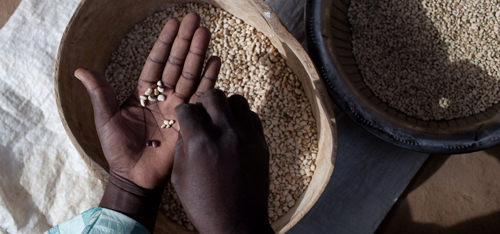Documents
Since 2001, the Integrated Production and Pest Management Programme (IPPM) has worked with more than 180 000 farmers in West Africa to build more productive and resilient agricultural systems. Based on a well-tested farmer field school (FFS) approach, this participatory, community-based educational method combines principles and practices from community development, non-formal education, agroecology and adaptive ecosystem management.
The IPPM programme is producing a series of theme-based training manuals to aid facilitators during farmer field school trainings. This specific document has been produced in French language for the sub-Saharan francophone regions on cotton production.
This case study reports on how the Farmer Field School (FFS) model has been used in the context of the programme to catalyze important changes among stakeholders in the savannah zones of West Africa.
The Improved Global Governance for Hunger Reduction programme seeks to concretely improve the way in which the global community works together to eradicate hunger and malnutrition. The programme is funded by the European Union (EU) and the Food and Agriculture Organization of the United Nations (FAO).
A strategic and localized approach to increasing national and regional agricultural production in a sustainable way. The combined pressure from growing populations, unsustainable agronomic practices, limited access to markets, weak infrastructure, deforestation, degraded soils and climate variability threaten the livelihoods and food and nutrition security of farming communities in the poorest developing countries.
We provide results from a study of two separate sectors within the cotton-growing region of southern Mali. In one sector, farmers have engaged in a farmer field school (FFS) training programme since 2003 — the other not. One goal of the training was the adoption of alternatives to the use of hazardous insecticides, through integrated pest management (IPM) methods.
We outline an approach to pesticide risk assessment that is based upon surveys
of pesticide use throughout West Africa. We have developed and used
new risk assessment models to provide, to our knowledge, the first detailed,
geographically extensive, scientifically based analysis of pesticide risks for
this region.
It is difficult to assess pollution in remote areas of less-developed regions owing to the limited availability of energy, equipment, technology, trained personnel and other key resources. Passive sampling devices (PSDs) are technologically simple analytical tools that sequester and concentrate bioavailable organic contaminants from the environment.
Le champ école paysan (FFS, «Farmer Field School»), quelle que soit sa dénomination, est un processus d’apprentissage en groupe dans lequel les agriculteurs et les agricultrices pratiquent des activités d’apprentissage par l’expérience qui les aident à comprendre l’écologie de leurs champs et à améliorer leurs pratiques culturales. L’article fournit un exemple de cette méthodologie.

